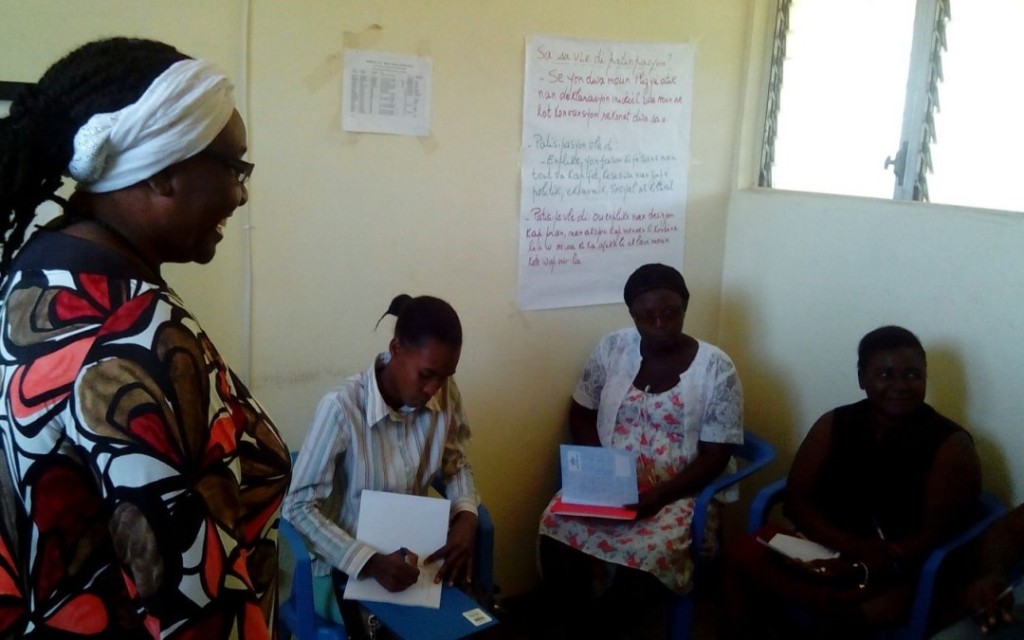Article first published on the Coordination Europe-Haiti website here.

In 2010, about twenty Haitian human rights organisations launched a programme for the promotion of engaged citizenship. The idea of the programme was born after the earthquake of January 2010, which destroyed a large part of the Haitian capital and surrounding cities and which caused the death of thousands of people, and wounded many more, as well as destroyed countless buildings. At that time, when there was a lot of talking about the reconstruction of Haiti, human rights defenders had the idea to rebuild the country on other foundations, promoting new values that could break the dynamic of exclusion that had always characterised social relations in Haiti and that, according to them, is at the root of the disaster experienced during the earthquake.
Supported by a Canadian organisation specialised in human rights education, Equitas, the people and institutions that have started the movement, developed an educational toolkit called “I’M COMMITTED, TOGETHER WE BUILD”. The kit contains a number of tools, which the facilitators can use to encourage their communities to join forces in order to take their future into their own hands.
The toolkit is using a spiral methodology that starts with the individual who will share his or her knowledge, experience and capacities with other community members in order to reflect on shared problems, to search together for solutions and to act in benefit of the community. The process always ends with a joint action to change a situation identified as a problem affecting the community. The toolkit uses both the human rights approach and the participatory approach. The initiators of the movement have identified exclusion and discrimination as two major problems that hamper the Haitian society to advance. They have chosen inclusion, participation, respect, justice, solidarity, collaboration and non-discrimination as primary values, which will be promoted through this effort to build a new society respectful of everybody’s rights.
The development of the toolkit represented the first phase of the programme. The second phase implied the training of facilitators (male and female) how to use the toolkit to promote engaged citizenship in Haiti. The third phase is community mobilisation and dialogue with the authorities in order to obtain sustainable changes within the community. In 2016, the programme already trained 17 people as coaches, as well as 155 facilitators. Five national training sessions on the use of the toolkit took place, in addition to three community forums, and on May 13 and 14 an intercommunity forum and national dialogue with both national and local authorities. As a result of the initiatives of the facilitators already approximately 1600 community leaders participated in activities related to the toolkit.
The first issues the partners of the programme decided to tackle at the community forums were on women’s participation, the inclusion of people living with a handicap as well as of LGBTI persons, and non-violence with regard to children. A national follow-up survey showed that the in-depth results in four communities had enabled these communities to prepare a first document to be discussed with the authorities. In other communities discussions are foreseen on issues that worry the citizens, as well as advocacy actions with the authorities on these issues.
This programme is starting to change profoundly the way in which human rights organisations used to work. Not only do they now have a common toolkit that they can adapt to different situations, but the programme also offers them the possibility to work together, to engage with other actors and to search for strategies to tackle common problems in a participatory way. The first changes can be observed in the way people communicate within organisations and communities. From now on, in the pilot zones of the programme, people are giving more attention to traditionally marginalised groups, such as handicapped people. For example, in La Victoire, a community in the north of Haiti, the inhabitants have defined strategies to ensure the presence and participation of people with a handicap in all activities and they take their opinions and proposals into account. Also, LGBTI persons are being accepted more and more; discrimination and violence against them is not being accepted. Parents who were made aware of the problem of violence against their children, especially the beatings at school, have organised themselves in committees in order to monitor the observance of the law prohibiting this kind of violence. Some communities have mobilised themselves to regularly tackle certain problems, such as cleaning a public area or market place. In the end, the aim of the programme is the sustainability of these actions bringing about irreversible change of undesirable situations and behaviour.
Even though the Programme of Engaged Citizenship has benefited from the methodological support of a foreign organisation specialised in human rights education, it is a genuinely Haitian product, designed by Haitian men and women to respond to an actual need of the country after the earthquake: that of reconstruction on new foundations, with the help of new values and seeking the participation of all groups, especially of those which have been marginalised for a long time. The implementation of the programme has benefited from the financial support of several organisations, such as Canadian cooperation (Global Affairs Canada), Christian Aid and AJWS (American Jewish World Service). GARR (Groupe d’Appui aux Rapatriés et aux Réfugiés) is coordinating the programme in Haiti. Currently (2016) the partners are reflecting on the creation of a more permanent structure that would enable continued support to the countless organisations and communities in the country.
— By Colette Lespinasse, Coach of the Programme for Engaged Citizenship
Article first published on the Coordination Europe-Haiti website here.